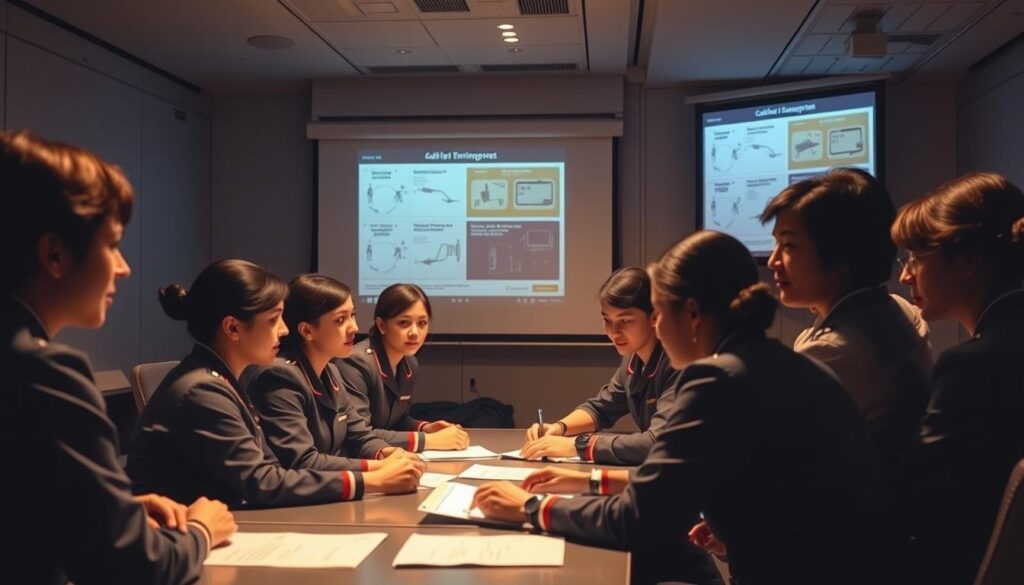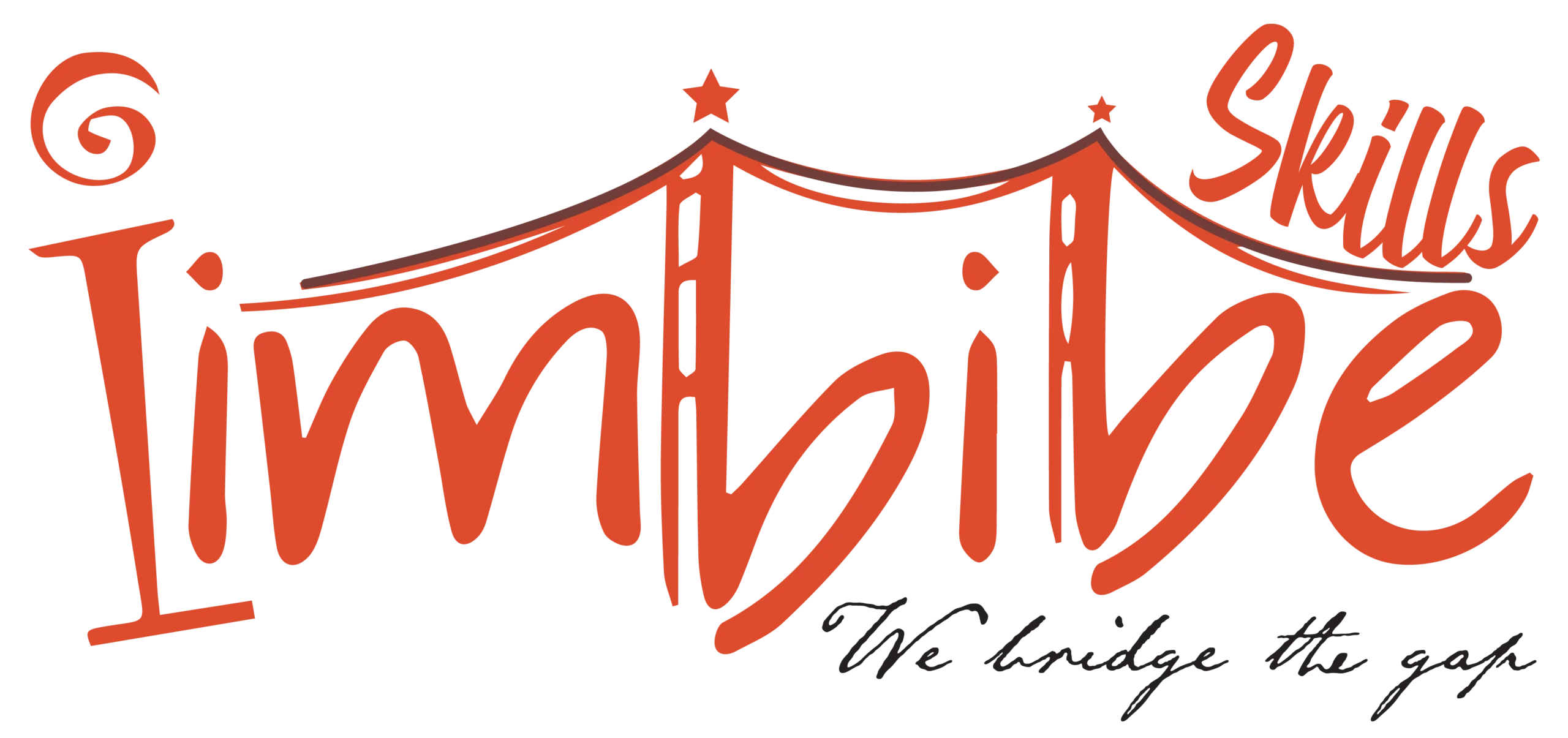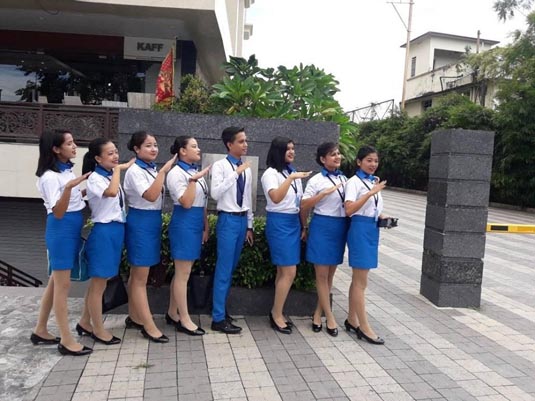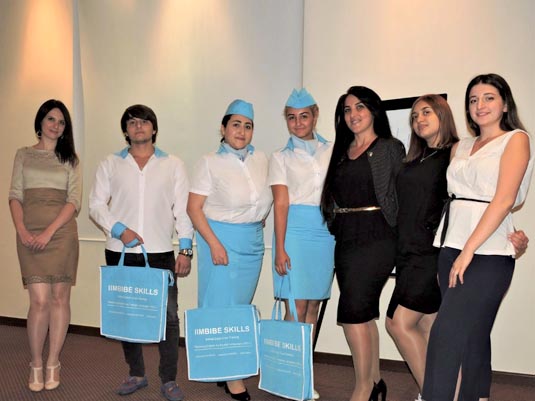Embarking on a career as cabin crew can be a thrilling adventure, offering a unique blend of travel, personal interaction, and the satisfaction of ensuring passenger safety. Pursuing an aviation career requires a specific set of skills and training, which can now be accessed through online courses designed to equip you with the necessary knowledge and confidence.
Our comprehensive guide will walk you through the steps to become cabin crew, highlighting the importance of air hostess training in preparing you for this demanding yet rewarding role. From understanding the basic requirements to mastering the skills needed for a successful aviation career, we cover it all.
Key Takeaways
- Understand the basic requirements for becoming cabin crew.
- Learn about the importance of air hostess training.
- Discover how online courses can prepare you for an aviation career.
- Explore the skills needed to succeed as cabin crew.
- Find out how to choose the right training program for you.
The Exciting World of Cabin Crew: Career Overview
Embarking on a career as cabin crew is an adventure like no other, filled with travel, cultural exchange, and the satisfaction of ensuring passenger safety. The role is both challenging and rewarding, making it a unique career path for those who enjoy working in a dynamic environment.
What Cabin Crew Members Actually Do
Cabin crew members are responsible for ensuring the safety and comfort of airline passengers. Their duties include conducting pre-flight safety checks, demonstrating safety procedures, serving food and beverages, and handling emergency situations. Excellent customer service skills are crucial, as they interact with passengers from diverse backgrounds. According to Delta Air Lines, “The role of a flight attendant is to provide top-notch customer service while maintaining the highest level of safety and security on board.”
The Global Demand for Flight Attendants
The demand for flight attendants is on the rise globally, driven by the growth of the airline industry. As air travel continues to increase, airlines are seeking qualified individuals to join their cabin crew teams.
“The global airline industry is expected to continue its growth trajectory, leading to more job opportunities for aspiring flight attendants.”
notes a report by the International Air Transport Association (IATA). This growth presents a promising outlook for those pursuing a career in aviation.
Why People Choose This Career Path
Individuals are drawn to a career as cabin crew for various reasons, including the opportunity to travel, experience different cultures, and enjoy a dynamic work environment. Many are attracted by the prospect of a career that offers a work-life balance, with varied schedules and routes. As flight attendant training becomes more accessible through online courses, more people can pursue their dream of becoming part of the aviation industry.
Essential Requirements to Become Cabin Crew
Becoming cabin crew involves more than just a passion for travel; it requires adhering to strict physical, educational, and personal standards. Airlines are very particular about who they hire, and for good reason.
Physical Requirements and Appearance Standards
Cabin crew candidates must meet specific physical requirements, including height, weight, and body mass index (BMI) standards that vary by airline. For instance, some airlines require a minimum height of 5’2″ and a maximum BMI of 25. Grooming and appearance standards are also crucial, with expectations for neat, professional attire and minimal visible tattoos or piercings.
Educational Qualifications Needed
While specific educational requirements can vary, most airlines require a high school diploma or equivalent. Some may prefer or require a degree in hospitality, customer service, or a related field. Aviation training or a certification in first aid and CPR can be advantageous. Enrolling in a reputable cabin crew course can also provide a competitive edge.
Personality Traits Airlines Look For
Airlines seek cabin crew with excellent communication skills, a customer-centric attitude, and the ability to remain calm under pressure. Flexibility, teamwork, and a positive demeanor are also highly valued. As one airline executive noted, “We’re not just looking for someone who can serve drinks; we’re looking for individuals who can ensure the safety and comfort of our passengers.”
By understanding and meeting these essential requirements, aspiring cabin crew can better prepare themselves for the challenges and opportunities that come with this rewarding career.
Traditional vs. Online Air Hostess Training: What's the Difference?
The aviation industry has seen a significant shift in how cabin crew training is conducted, with online air hostess training emerging as a popular alternative to traditional methods. This change is driven by the need for flexibility and accessibility in training programs.
Limitations of In-Person Training Programs
Traditional in-person training programs have several limitations. They can be restrictive in terms of location and time, making it difficult for individuals with other commitments to participate. Moreover, these programs may not offer the same level of flexibility in learning pace as online courses.
As noted by industry experts, “Traditional training methods can be inflexible and may not cater to the diverse needs of trainees.” This highlights the need for more adaptable training solutions.
Benefits of Choosing Online Training
Online air hostess training offers numerous benefits, including flexibility and self-paced learning. Trainees can access course materials from anywhere, at any time, making it easier to balance training with other responsibilities. Online training also allows for a more personalized learning experience.
Hybrid Training Options
For those who prefer a mix of traditional and online learning, hybrid training options are available. These programs combine the benefits of in-person instruction with the flexibility of online learning, offering a comprehensive training experience.
By understanding the differences between traditional and online air hostess training, aspiring flight attendants can make informed decisions about their career paths.
Finding the Right Online Air Hostess Training Course
The key to becoming a competent cabin crew member lies in finding an accredited online air hostess training course. With the rise of digital learning, numerous programs have emerged, offering varying levels of quality and comprehensiveness.
Accredited Online Training Programs
Accreditation is paramount when selecting an online training program. It ensures that the course meets industry standards and is recognized by airlines worldwide.
Top-Rated Training Providers
Some of the top-rated training providers include International Air and Hospitality Academy and Pan Am International Flight Academy. These institutions have a proven track record of producing well-prepared cabin crew members.
Accreditation Standards to Look For
When evaluating accreditation, look for programs approved by aviation authorities such as the Federal Aviation Administration (FAA) in the United States or the European Aviation Safety Agency (EASA) in Europe. Accreditation standards typically include rigorous training in safety procedures, customer service, and aviation regulations.
“Accreditation is not just a stamp of approval; it’s a guarantee that the training program has met stringent standards to prepare students for the demands of being a flight attendant.”
— Aviation Expert
Airline-Specific Training Courses
Some online training programs are tailored to specific airlines, offering customized content that aligns with the airline’s policies and procedures. For instance, Delta Airlines offers its own training program for aspiring flight attendants.
Airline-specific training can be beneficial as it prepares candidates for the exact requirements of the airline they wish to join.

Cost Comparison and ROI
The cost of online air hostess training programs can vary significantly, ranging from $1,000 to $5,000 or more. When comparing costs, consider the return on investment (ROI). A more expensive program may offer better job placement rates or higher certification success rates, ultimately providing a better ROI.
| Training Provider | Cost | Job Placement Rate |
|---|---|---|
| International Air and Hospitality Academy | $2,500 | 85% |
| Pan Am International Flight Academy | $3,000 | 90% |
| Delta Airlines Training Program | $4,000 | 95% |
By carefully evaluating these factors, aspiring cabin crew members can make an informed decision when choosing an online air hostess training course.
Core Curriculum: What You'll Learn in Online Training
The online air hostess training curriculum is carefully crafted to ensure that you gain the expertise needed to provide exceptional service and ensure passenger safety. This comprehensive program covers a wide range of topics, from safety procedures to customer service excellence.
Safety and Emergency Procedures
Safety is paramount in the aviation industry, and online training programs place a strong emphasis on preparing you for any situation. You’ll learn about safety procedures and emergency protocols to ensure you’re equipped to handle emergencies effectively.
First Aid and Medical Response
You’ll be trained in first aid and medical response techniques, enabling you to provide immediate care in medical emergencies. This includes understanding how to use medical equipment and administering basic life support.
Emergency Evacuation Protocols
Understanding emergency evacuation protocols is crucial. You’ll learn how to efficiently evacuate an aircraft in emergency situations, ensuring passenger safety.
Customer Service Excellence
Providing customer service excellence is key to a successful cabin crew career. Online training programs teach you how to deliver exceptional service, handle difficult passengers, and create a positive flying experience.
- Understanding passenger needs and expectations
- Effective communication techniques
- Conflict resolution strategies
Aviation Regulations and Compliance
You’ll gain a thorough understanding of aviation regulations and the importance of compliance. This includes familiarization with international aviation standards and regulatory requirements.
Cultural Sensitivity and Diversity Training
In today’s globalized world, cultural sensitivity is crucial. Online training programs include diversity training to help you understand and respect different cultures, enhancing your ability to serve diverse passengers.
By covering these essential topics, online air hostess training programs ensure that you’re well-prepared for your role as a cabin crew member. You’ll have the knowledge and skills needed to excel in your career and provide exceptional service to passengers.
The Certification Process Explained
To become a certified cabin crew member, one must undergo a detailed certification process that includes examinations, practical training, and maintaining certification. This process is designed to ensure that cabin crew members have the necessary knowledge, skills, and abilities to perform their duties safely and effectively.
Required Examinations and Assessments
The certification process begins with required examinations and assessments that test your knowledge of safety procedures, aviation regulations, and customer service standards. These examinations are typically conducted online or in a classroom setting and may include multiple-choice questions, written essays, or oral presentations. For instance, a typical examination might include questions on emergency procedures, first aid, and conflict resolution.
- Multiple-choice questions on safety procedures
- Written essays on customer service standards
- Oral presentations on aviation regulations
Practical Training Components
Practical training is a crucial component of the certification process, providing hands-on experience in areas such as safety equipment operation, emergency response, and customer service. This training is typically conducted in a simulated environment or through in-person assessments.
Simulation Training
Simulation training allows you to practice handling emergency situations in a controlled environment. This type of training is invaluable for preparing cabin crew members for real-life scenarios. For example, simulation training might include evacuating an aircraft in an emergency or responding to a medical emergency on board.

In-person assessments evaluate your ability to apply your knowledge and skills in a practical setting. These assessments may include demonstrations of safety procedures, customer service interactions, and teamwork exercises. A quote from a seasoned flight attendant highlights the importance of this training: “The in-person assessments were challenging, but they prepared me well for the realities of being a cabin crew member.”
“The key to success in the certification process is being prepared for both the written examinations and the practical assessments.” –
Jane Doe, Certified Flight Attendant
Maintaining Your Certification
Maintaining your certification involves completing recurrent training and meeting the regulatory requirements set by aviation authorities. This ensures that cabin crew members stay up-to-date with the latest safety procedures and industry standards. The following table outlines the typical requirements for maintaining certification:
| Recurrent Training | Frequency | Regulatory Requirement |
|---|---|---|
| Safety Procedures | Every 12 months | FAA Regulation 121.417 |
| Customer Service Standards | Every 18 months | Airline Company Policy |
| Emergency Response | Every 24 months | ICAO Annex 6 |
By understanding and completing these requirements, cabin crew members can maintain their certification and continue to work in the aviation industry.
From Training to Employment: The Application Process
The journey from training to employment is crucial for aspiring cabin crew members. It involves several key steps that can make or break your chances of landing a job.
Creating a Standout Cabin Crew Resume
A well-crafted resume is your ticket to getting noticed by airlines. It’s essential to highlight relevant skills and experience that align with the cabin crew role.
Highlighting Relevant Skills and Experience
Emphasize your customer service skills, ability to work under pressure, and any experience in the service industry. Use action verbs like “managed,” “created,” and “improved” to describe your achievements.
Professional Presentation Tips
Ensure your resume is visually appealing and free of errors. Use a clear, concise format and a standard font like Arial or Calibri.
Acing the Interview Process
Preparation is key to acing the interview. Research the airline, practice common interview questions, and be ready to demonstrate your skills and personality.
Assessment Day Success Strategies
On assessment day, stay calm and be yourself. Show enthusiasm for the role and the airline. Be prepared to participate in group activities and presentations, showcasing your teamwork and communication skills.
Career Growth and Advancement Opportunities
The aviation industry is renowned for its dynamic nature, and as a cabin crew member, you’ll have the chance to explore various career progression paths and specialization options. This career path is not just about serving passengers; it’s about building a fulfilling profession with numerous opportunities for growth and development.
Progression Paths in the Aviation Industry
As a cabin crew member, you start with a foundational role that involves ensuring the safety and comfort of passengers. With experience, you can progress to senior cabin crew positions, taking on more responsibilities such as leading teams or mentoring new crew members. Further career advancement can lead to roles like purser or chief purser, where you’ll oversee the entire cabin crew and manage in-flight services.
Career progression also opens up opportunities to move into different areas of the airline, such as ground operations, customer service, or even airline management. Some crew members choose to transition into training roles, where they teach new recruits the skills and knowledge required for the job. Others may move into specialized departments like safety and compliance or crew resource management.
Specialization Options for Cabin Crew
Cabin crew members can choose to specialize in various areas, enhancing their career prospects and personal satisfaction. One popular specialization is in safety and emergency procedures, where crew members become experts in handling critical situations. Others may focus on customer service excellence, developing skills to handle diverse passenger needs and preferences.
Specialization can also lead to roles in aviation regulations and compliance, ensuring that the airline adheres to all relevant laws and standards. Additionally, with the increasing importance of cultural sensitivity, crew members can specialize in cultural diversity training, helping to foster a more inclusive and respectful in-flight environment.
By understanding the various progression paths and specialization options available, you can tailor your career to suit your interests and strengths, leading to a more fulfilling and successful career as cabin crew.
Conclusion: Your Journey to the Skies Begins Now
Embarking on a career as cabin crew can be a thrilling experience, offering a unique blend of travel, personal growth, and service to others. With the aviation industry continually evolving, the demand for skilled and trained flight attendants is on the rise.
An online air hostess training course is your gateway to this exciting world. By choosing the right training program, you can gain the necessary skills and knowledge to succeed in this role. From safety procedures to customer service excellence, online training equips you with everything you need to start a successful career in aviation.
As you consider starting a career in aviation, remember that this profession is not just about ensuring safety on board; it’s also about providing exceptional service and creating memorable experiences for passengers. With the right training and mindset, you can thrive in this dynamic environment and enjoy a rewarding career.
Take the first step towards your dream job today by exploring accredited online air hostess training courses. Your journey to the skies begins now, and with dedication and the right training, you can soar to new heights in the aviation industry.
FAQ
What are the basic requirements to become cabin crew?
To become cabin crew, you typically need to meet certain physical and appearance standards, have a high school diploma or equivalent, and possess excellent communication skills. Airlines also look for personality traits such as friendliness, flexibility, and the ability to work well under pressure.
How long does online air hostess training take?
The duration of online air hostess training varies depending on the program and provider. Some courses can be completed in a few weeks, while others may take several months. It’s essential to research and choose a program that fits your schedule and learning style.
Is online air hostess training accredited?
Reputable online air hostess training programs are accredited by recognized aviation authorities, such as the Federal Aviation Administration (FAA) in the United States. Look for programs that are certified by these organizations to ensure you receive high-quality training.
Can I become cabin crew without prior experience?
Yes, many airlines provide training for new recruits, so prior experience is not always necessary. However, having relevant skills, such as customer service experience, can be beneficial in the application process.
How do I choose the right online air hostess training course?
When selecting an online air hostess training course, consider factors such as accreditation, course content, and provider reputation. Research top-rated providers, read reviews, and compare costs to find the best fit for your needs and budget.
What topics are covered in online air hostess training?
Online air hostess training typically covers a range of topics, including safety and emergency procedures, customer service excellence, aviation regulations, and cultural sensitivity training. The specific curriculum may vary depending on the program and provider.
How do I maintain my cabin crew certification?
To maintain your cabin crew certification, you typically need to complete recurrent training and meet the requirements set by the relevant aviation authority. This may involve completing online or in-person training sessions, as well as meeting specific medical and fitness standards.
What are the career advancement opportunities for cabin crew?
Cabin crew can progress to senior roles, such as lead flight attendant or purser, or move into specialized areas like training or recruitment. Some may also choose to transition into related fields, such as customer service or aviation management.
How do I create a standout cabin crew resume?
To create a standout cabin crew resume, focus on highlighting relevant skills and experience, such as customer service or safety training. Use a clear and concise format, and tailor your application to the specific job you’re applying for.
What should I expect on assessment day?
On assessment day, you can expect to participate in a range of activities, including group exercises, presentations, and interviews. Be prepared to demonstrate your skills, personality, and motivation for becoming cabin crew.



